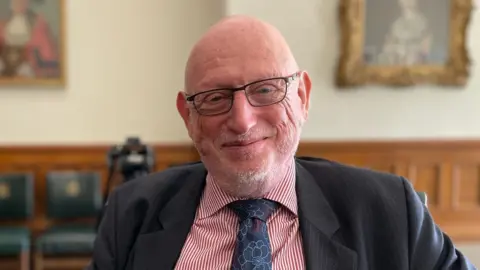Birmingham eyes best of times after worst of times
 Birmingham City Council
Birmingham City CouncilThe new year is often seen as a fresh start but, while there is some sign of that in Birmingham, there's often also a severe hangover to deal with.
The city council's financial ghosts, past and present, heralded the worst of times in its recent history. But it's hoped the best, or at least better, times lie in the not too distant future.
The council is still effectively bankrupt, and Scrooge-like savings are being made, with £300m targeted this financial year and in the coming one.
No Christmas miracle is expected, but there is a flicker of holiday hope. The season of goodwill appears to have resonated with council and union bosses who, at last, agreed a deal to settle equal pay claims.

However, more service cuts lie ahead and, it's predicted, a successive 10 per cent council tax rise for people living in the city.
The lengthy equal pay dispute came as workers in female-dominated roles, like teaching assistants and social workers, said they had been historically underpaid compared to colleagues in male-dominated roles, such as waste collection.
But now we have a settlement agreement, and it's arguably the most significant piece of news to come out of the city this year.
Impact on morale 'immeasurable'
The cost of the long-running dispute snowballed with every day, hour and minute that passed – adding to the council's financial woes at a disturbing pace.
It was feared it could cost as much as £760m, but it seems to have been settled for around half that.
At last, some relief for the council and the people who rely on its services. But relief also for the thousands, mainly women, who have spent years feeling undervalued while battling for money they believed they were owed.
The financial value of such a settlement can be calculated in pounds and pence. But the value of it to these workers, in terms of the impact on their morale and productivity, is immeasurable.

But do not be fooled into thinking this means the financial challenges at Birmingham City Council are over.
Max Caller, the lead commissioner who was appointed by the previous government to oversee the council's recovery, has been clear.
More cuts and tax rises are expected, because they relate mainly to historic financial mismanagement at the council rather than the equal pay burden.
What it could mean is the council needs to borrow less money from central government and, therefore, sell off fewer assets to fund any debt in the form of exceptional financial support.
So the family silver might yet survive to be passed down to the next generation of Brummies.
At a time when holiday cheer has been hard to come by in England's second city, there will be plenty happy to raise a glass to that as we see in 2025.
Follow BBC West Midlands on Facebook, X and Instagram. Send your story ideas to: [email protected]
